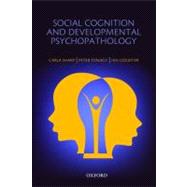
Note: Supplemental materials are not guaranteed with Rental or Used book purchases.
Purchase Benefits
What is included with this book?
| Introduction | |
| Developmental Disorders | |
| Social cognition and autism spectrum conditions | |
| Social cognition in children with learning disabilities | |
| Language and theory of mind in atypically developing children: evidence from studies of deafness, blindness and autism | |
| Externalizing Disorders | |
| Social cognition and disruptive behaviour disorders in young children: families matter | |
| Social information processing and the development of conduct problems in children and adolescents: looking beneath the surface | |
| Empathic dysfunction in psychopathy | |
| Internalizing Disorders | |
| Social cognition in depressed children and adolescents | |
| Social cognition and anxiety in children | |
| Social cognition and attachment-related dissorders | |
| Other Considerations | |
| Attachment, affect-regulation and mentalization: the developmental origins of the representational affective self | |
| Making links between emotion understanding and developmental psychopathology in young children | |
| Social cognition and genetics | |
| Treatment outcome of childhood disorders: the perspective of social cognition | |
| Table of Contents provided by Publisher. All Rights Reserved. |
The New copy of this book will include any supplemental materials advertised. Please check the title of the book to determine if it should include any access cards, study guides, lab manuals, CDs, etc.
The Used, Rental and eBook copies of this book are not guaranteed to include any supplemental materials. Typically, only the book itself is included. This is true even if the title states it includes any access cards, study guides, lab manuals, CDs, etc.